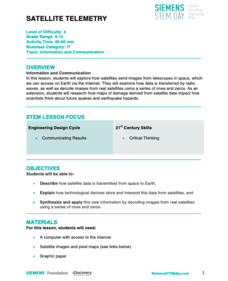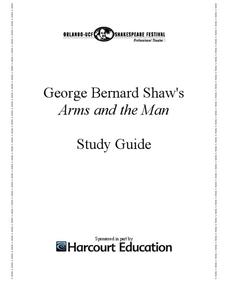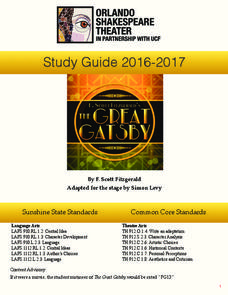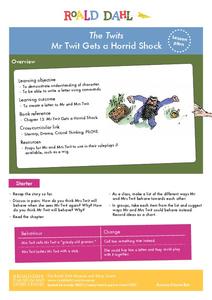Star Wars in the Classroom
"Shakespeare and Star Wars": Lesson Plan Day 4
Class members have an opportunity to compare how a film and a play handle the same source material by viewing the opening chapters of George Lucas's Star Wars: A New Hope and acts I and II of Ian Doescher's play, William Shakespeare's...
Star Wars in the Classroom
"Shakespeare and Star Wars": Lesson Plan Days 13 and 14
How important are sound effects in films? In stage plays? In radio programs? To gain an understanding of the impact of these special effects, class members watch a short video spoof of the sound in a scene from Star Wars: A New...
Star Wars in the Classroom
"Shakespeare and Star Wars": Lesson Plan Days 8 and 9
How does an author's choice of artistic medium influence an audience? What about how an author chooses to transform original source material? These are the questions class members grapple with as they compare scenes from episode IV...
Star Wars in the Classroom
"Shakespeare and Star Wars": Lesson Plan Day 6
How can a screenplay create meaning and drama in ways that other forms of writing cannot? That is the question class members must answer as they compare the cantina scene of the screenplay for George Lucas's Star Wars: A New Hope with...
Discovery Education
Satellite Telemetry
Satellites require rockets to launch, but it doesn't take a rocket scientist to understand them. Future engineers learn about how satellites send data to Earth and how to interpret satellite images. They see how radio waves play a role...
California Education Partners
Glass Menagerie
As a reading comprehension assessment, ninth graders are asked to use evidence drawn from The Glass Menagerie to support an analysis of how Tennessee Williams uses specific lines to develop Amanda's character as well as her relationships...
Orlando Shakes
Arms and the Man: Study Guide
Few aspects of life make better fodder for a comedic play than politics. A study guide introduces George Bernard's Shaw comedy Arms and the Man. Along with summaries of each scene and brief biographies of the main characters, two lesson...
Historical Thinking Matters
Rosa Parks: 5 Day Lesson
What led to the success of the Montgomery Bus Boycott, and how might historians approach this question differently? This rich series of lessons includes a short introductory video clip, analysis of six primary source documents, and...
Historical Thinking Matters
Rosa Parks: 3 Day Lesson
How can evidence and perspective challenge even the most well-known of stories? Through primary and secondary source analysis, think-alouds, and discussion, young historians evaluate the historical narrative of Rosa Parks across multiple...
Orlando Shakes
The Great Gatsby: Study Guide
Uncover the exciting world of the Roaring Twenties with The Great Gatsby study guide. Individuals become critics as they write a review of the production. Scholars also read historical information and analyze the differences between the...
Roald Dahl
The Twits - Mr Twit Gets a Horrid Shock
Mr. and Mrs. Twit do not treat each other very nicely. The sixth lesson in an 11-part unit designed to accompany The Twits by Roald Dahl explores the way the characters talk to and treat one another. Role play and writing activities...
Council for Economic Education
New Sense, Inc. vs. Fish 'Till U Drop or Coase Vs. Pigou
Who is responsible for protecting the environment, and who should pay when it is damaged? The role of government and private industry is complicated. A role-play simulation prompts individuals to decide how to protect a fictitious town...
Kenan Fellows
Attack of the Aphids!
Insects threaten the food production industry, and aphids are one of the big players! Analyzing data of aphid populations gives insight into their behaviors. Learners model the population data of an uninhibited population with an...
University of North Carolina
Art History
Art analysis might help uncover some of life's most puzzling questions, such as the mystery behind Mona Lisa's smile. The handout, from the Writing for Specific Fields series, is particularly useful for those interested in pursuing art...
National Endowment for the Humanities
“Read All About It”: Primary Source Reading in “Chronicling America”
Can investigative journalism become too sensationalistic and accusatory, or is it vital for the survival of a democracy? Middle schoolers analyze primary source documents from early 20th-century newspapers as well as Theodore Roosevelt's...
Curated OER
Eyes On Me
Students investigate the human eye. In this biology lesson, students read the book Look At Your Eyes and locate the various parts of their eye. Students play the game "I Spy."
Crafting Freedom
Thomas Day's Letter to His Daughter, Mary Ann
Why is a letter a better way to learn about a person than a different primary source? Explore Thomas Day's ideas and advice to his daughter in a letter from 1851, which details the struggles of the American South before the Civil War....
Curated OER
Literary Response and Analysis: Romeo and Juliet's
Tenth graders complete characterization analysis for Shakespeare's Romeo and Juliet. In this characterization lesson, 10th graders work in learning tiers to analyze the characters and plot in the play. Students work under, at, and above...
Curated OER
Data and Probability- What's the Chance?
Young scholars investigate probability through a game. In this data lesson, students use dice and predictions to explore how probability works.
Curated OER
Role-Playing Jean Talon
Young scholars explore New France. In this New France lesson, students examine census data compiled by Jean Talon in 1665 and 1666. Young scholars take on the role of Talon trying to convince the King of France to increase his...
Curated OER
Data Handling: Bar Chart Showing Frequency
In this bar graph worksheet, students analyze a bar graph showing soccer goals scored. Students then use the data to solve 7 problems.
Curated OER
Macbeth: Quotations
In this Macbeth instructional activity, students read passages from Macbeth and answer the prompts for each one. Prompts include identifying the speaker, describing the context of the quote, and explaining the significance of one of...
Curated OER
Categorizing Data and Bias
In this categorizing data and bias worksheet, 9th graders solve 10 different problems that include various types of qualitative or quantitative data. First, they determine if the problem stated is univariate or bivariate data. Then,...
Curated OER
Organising Data
Students complete data organization activities. In this data organization lesson, students watch online clips about organizing data. Students complete an eye color frequency table for their class. Students watch a clip about asking...

























